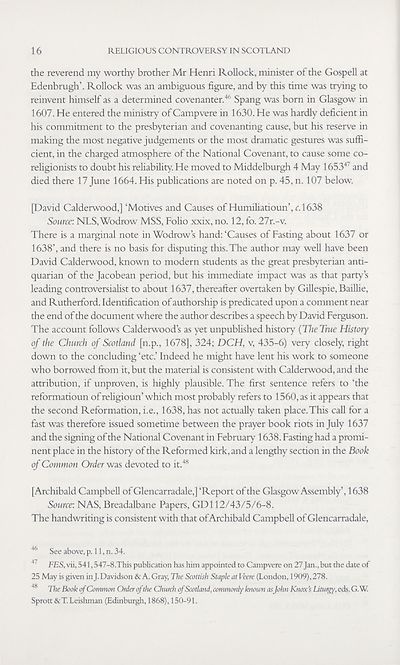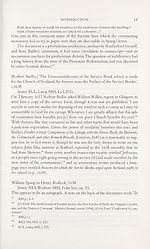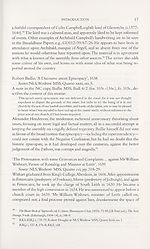Series 5 > Religious Controversy in Scotland 1625-1639
(31) Page 16
Download files
Complete book:
Individual page:
Thumbnail gallery: Grid view | List view

16
RELIGIOUS CONTROVERSY IN SCOTLAND
the reverend my worthy brother Mr Henri Rollock, minister of the Gospel! at
Edenbrugh’. Rollock was an ambiguous figure, and by this time was trying to
reinvent himself as a determined covenanter.46 Spang was born in Glasgow in
1607. He entered the ministry of Campvere in 1630. He was hardly deficient in
his commitment to the presbyterian and covenanting cause, but his reserve in
making the most negative judgements or the most dramatic gestures was suffi¬
cient, in the charged atmosphere of the National Covenant, to cause some co¬
religionists to doubt his reliability. He moved to Middelburgh 4 May 165347 and
died there 17 June 1664. His publications are noted on p. 45, n. 107 below.
[David Calderwood,] ‘Motives and Causes of HumiHatioun’, cl638
Source: NLS.Wodrow MSS, Folio xxix, no. 12, fo. 27r.-v.
There is a marginal note inWodrow’s hand:‘Causes of Fasting about 1637 or
1638’, and there is no basis for disputing this.The author may well have been
David Calderwood, known to modern students as the great presbyterian anti¬
quarian of the Jacobean period, but his immediate impact was as that party’s
leading controversialist to about 1637, thereafter overtaken by Gillespie, Bailhe,
and Rutherford. Identification of authorship is predicated upon a comment near
the end of the document where the author describes a speech by David Ferguson.
The account follows Calderwood’s as yet unpublished history (The True History
of the Church of Scotland [n.p., 1678], 324; DCH, v, 435-6) very closely, right
down to the concluding ‘etc.’ Indeed he might have lent his work to someone
who borrowed from it, but the material is consistent with Calderwood, and the
attribution, if unproven, is highly plausible. The first sentence refers to ‘the
reformatioun of religioun’ which most probably refers to 1560, as it appears that
the second Reformation, i.e., 1638, has not actually taken place.This call for a
fast was therefore issued sometime between the prayer book riots in July 1637
and the signing of the National Covenant in February 1638. Fasting had a promi¬
nent place in the history of the Reformed kirk, and a lengthy section in the Book
of Common Order was devoted to it.48
[Archibald Campbell of Glencarradale,] ‘Report of the Glasgow Assembly’, 1638
Source: NAS, Breadalbane Papers, GDI 12/43/5/6-8.
The handwriting is consistent with that of Archibald Campbell of Glencarradale,
46 Seeabove,p. ll,n. 34.
47 FES, vii, 541,547-8.This publication has him appointed to Campvere on 27 Jan., but the date of
25 May is given inj. Davidson & A. Gray, The Scottish Staple at Veere (London, 1909), 278.
48 The Book of Common Order of the Church of Scotland, commonly known asJohn Knox’s Liturgy, eds. G.W
Sprott &T. Leishman (Edinburgh, 1868), 150-91.
RELIGIOUS CONTROVERSY IN SCOTLAND
the reverend my worthy brother Mr Henri Rollock, minister of the Gospel! at
Edenbrugh’. Rollock was an ambiguous figure, and by this time was trying to
reinvent himself as a determined covenanter.46 Spang was born in Glasgow in
1607. He entered the ministry of Campvere in 1630. He was hardly deficient in
his commitment to the presbyterian and covenanting cause, but his reserve in
making the most negative judgements or the most dramatic gestures was suffi¬
cient, in the charged atmosphere of the National Covenant, to cause some co¬
religionists to doubt his reliability. He moved to Middelburgh 4 May 165347 and
died there 17 June 1664. His publications are noted on p. 45, n. 107 below.
[David Calderwood,] ‘Motives and Causes of HumiHatioun’, cl638
Source: NLS.Wodrow MSS, Folio xxix, no. 12, fo. 27r.-v.
There is a marginal note inWodrow’s hand:‘Causes of Fasting about 1637 or
1638’, and there is no basis for disputing this.The author may well have been
David Calderwood, known to modern students as the great presbyterian anti¬
quarian of the Jacobean period, but his immediate impact was as that party’s
leading controversialist to about 1637, thereafter overtaken by Gillespie, Bailhe,
and Rutherford. Identification of authorship is predicated upon a comment near
the end of the document where the author describes a speech by David Ferguson.
The account follows Calderwood’s as yet unpublished history (The True History
of the Church of Scotland [n.p., 1678], 324; DCH, v, 435-6) very closely, right
down to the concluding ‘etc.’ Indeed he might have lent his work to someone
who borrowed from it, but the material is consistent with Calderwood, and the
attribution, if unproven, is highly plausible. The first sentence refers to ‘the
reformatioun of religioun’ which most probably refers to 1560, as it appears that
the second Reformation, i.e., 1638, has not actually taken place.This call for a
fast was therefore issued sometime between the prayer book riots in July 1637
and the signing of the National Covenant in February 1638. Fasting had a promi¬
nent place in the history of the Reformed kirk, and a lengthy section in the Book
of Common Order was devoted to it.48
[Archibald Campbell of Glencarradale,] ‘Report of the Glasgow Assembly’, 1638
Source: NAS, Breadalbane Papers, GDI 12/43/5/6-8.
The handwriting is consistent with that of Archibald Campbell of Glencarradale,
46 Seeabove,p. ll,n. 34.
47 FES, vii, 541,547-8.This publication has him appointed to Campvere on 27 Jan., but the date of
25 May is given inj. Davidson & A. Gray, The Scottish Staple at Veere (London, 1909), 278.
48 The Book of Common Order of the Church of Scotland, commonly known asJohn Knox’s Liturgy, eds. G.W
Sprott &T. Leishman (Edinburgh, 1868), 150-91.
Set display mode to:
![]() Universal Viewer |
Universal Viewer | ![]() Mirador |
Large image | Transcription
Mirador |
Large image | Transcription
Images and transcriptions on this page, including medium image downloads, may be used under the Creative Commons Attribution 4.0 International Licence unless otherwise stated. ![]()
| Scottish History Society volumes > Series 5 > Religious Controversy in Scotland 1625-1639 > (31) Page 16 |
|---|
| Permanent URL | https://digital.nls.uk/127328337 |
|---|
| Description | Over 180 volumes, published by the Scottish History Society, containing original sources on Scotland's history and people. With a wide range of subjects, the books collectively cover all periods from the 12th to 20th centuries, and reflect changing trends in Scottish history. Sources are accompanied by scholarly interpretation, references and bibliographies. Volumes are usually published annually, and more digitised volumes will be added as they become available. |
|---|


